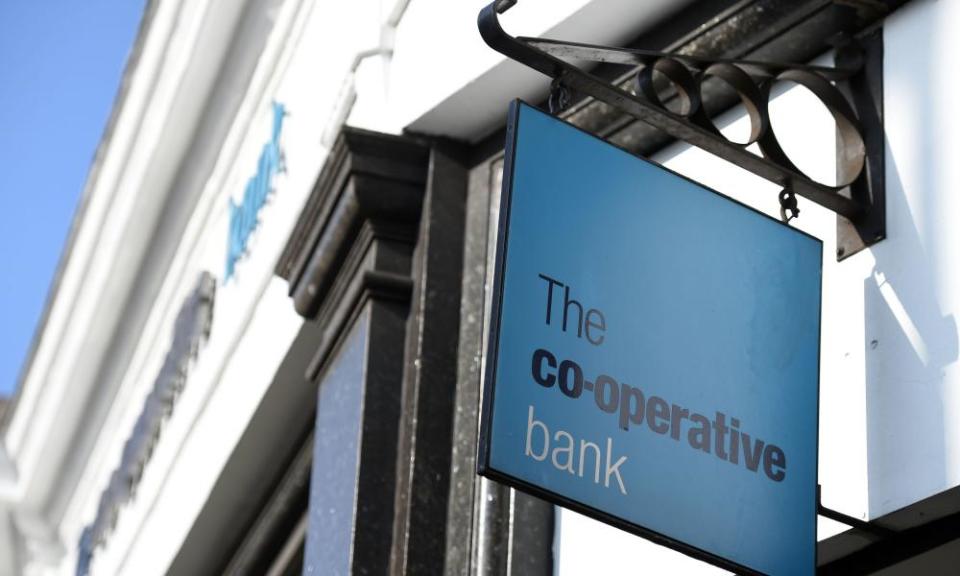Co-operative Bank sheds 25,000 current account customers but losses shrink

The Co-operative Bank lost 25,000 current account customers in the first half of the year amid uncertainty created by its race to raise £700m to bolster its capital position.
Even so, the chief executive thanked customers for their loyalty as the bank reported a narrowing in its first-half losses to £135m, from £177m.
Liam Coleman added that there had been uncertainty about the bank “and regrettably this is reflected in some customers deciding to move their accounts”.
He said this was 2% of its current account customers and that the outflows had moderated during May and June. In total, deposits, from which the bank generates most of its funding, fell by £1.5bn from the end of December to £20.9bn.
The bank has sought a long-term solution over its future since 2013 when its financial weakness was exposed, and it was mired in scandal after its former chair Paul Flowers was convicted for drug offences.
It has amassed more than £2.6bn of losses since its problems were uncovered and will only say it hopes to achieve profitability in the medium term.
After a series of rescue funds injected by hedge funds, the bank’s former owner, the Co-operative Group of grocers and funeral homes, is on course for its stake to drop to 1%.
“Following a period of uncertainty around the future of the bank, I’d like to express my thanks to our customers for their loyalty and our colleagues, regulators and wider stakeholders for the support they have shown,” Coleman said.
The figures included a £9.2m provision for the payment protection insurance mis-selling scandal.
The results benefited from a £12.7m fall in costs as 897 staff left, taking the workforce to 3,313, with further job cuts likely as it attempts to stem its losses. Co-operative Bank has 95 branches after closing 10 this year.
The bank hopes its ethical policies, which have been in place for 25 years, will continue to attract and keep customers despite the changes to its ownership structure.
There have been concerns that the Co-operative Bank will not be able to continue using its name because of a reliance on hedge funds for its financing, but Coleman said the name was “based on how we operate and not our ownership”.
“This is a great bank,” he added, describing its performance as resilient. He hopes to attract current account customers by offering a donation to homelessness charity Centrepoint. About 6% of current account customers left after the 2013 debacle, but numbers rose between 2014 and 2016, before slipping in the first half of this year.
The bank acknowledged it had been facing a “heightened degree of regulatory supervision” from the Bank of England since its near collapse in 2013 and was raising fresh capital to meet longer-term UK bank regulatory requirements.
The £700m is being raised in a complex restructuring after its attempts to find a buyer failed. There are two parts to the deal. The hedge funds are putting up to £250m of new funds into the bank and £433m of bonds need to be converted to shares.
Retail investors who own bonds will take losses of at least 55% and be offered cash rather than shares.
Five hedge funds – Silver Point Capital, GoldenTree, Anchorage Capital, Blue Mountain and Cyrus Capital – have led the discussions with the bank over its future. The fundraising is expected to be completed next month.
Coleman aims to attract new customers, including small businesses. Four years ago, the bank had ambitions to expand but had to abandon an attempt to buy 632 branches from Lloyds Banking Group.
“We believe the recapitalisation will enable the bank to move forward with confidence. We will be investing in the brand and renewing marketing efforts,” he said.
Co-operative Bank also relies on the backing of the regulatory division of Bank of England for its strategy. In the pages of risk disclosures and legal warnings in its interim report, it points out: “Deficiencies against regulatory requirements and expectations have existed for some time and will continue for some years to come while the bank implements its strategy.
“The successful implementation of the bank’s strategy depends on the [regulatory] authorities not taking enforcement action against the bank regarding any continuing and intervening deficiencies to required regulatory standards.”

 Yahoo Finance
Yahoo Finance 